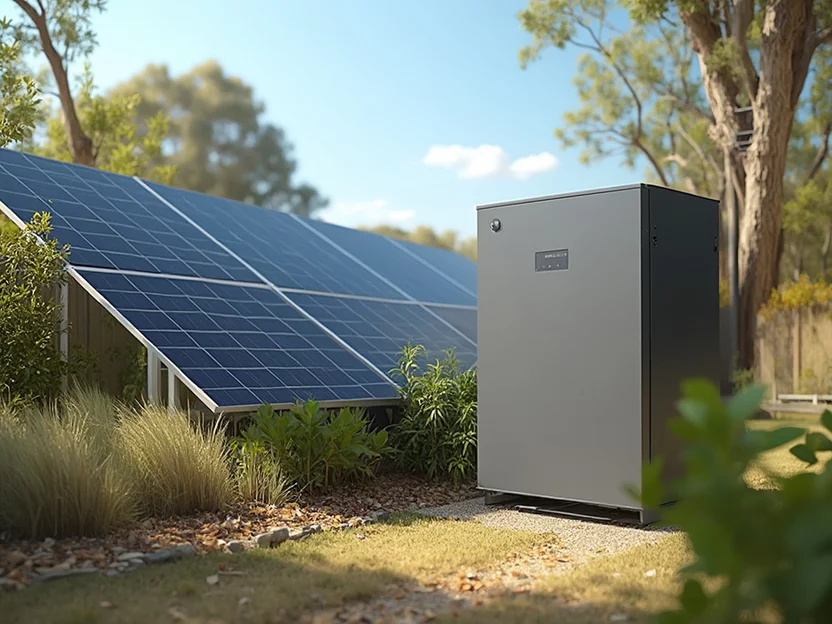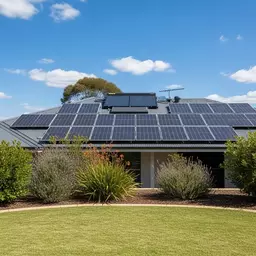Oct 11
Choosing Solar Battery Size in Adelaide
As renewable energy continues to shape our future, understanding the essentials of solar technology becomes paramount. In Adelaide, solar battery sizing can be the key to unlocking energy independence and cost savings. Are you ready to make the most of your solar investment?
What You Will Learn
- Choosing the right solar battery size enhances energy efficiency and reduces dependence on the grid.
- Understanding your household's energy consumption is crucial for selecting an appropriately sized battery.
- Recognizing peak consumption times helps tailor your solar battery to fit your unique energy needs.
- Evaluating different battery technologies, such as lithium-ion and lead-acid, is essential for making an informed choice.
- Battery capacity, measured in kilowatt-hours (kWh), directly impacts your ability to manage energy demands effectively.
- Budgeting for your solar battery investment involves considering initial costs, long-term savings, and available government incentives.
Solar Battery Selection & Sizing Guide for Adelaide Homes
Understanding your energy needs and the types of solar batteries available is key to maximizing efficiency and independence. This guide outlines the crucial steps and options for Adelaide homeowners.
Energy Needs Analysis
- Review energy bills
- Identify peak usage
- Consider future needs
- Use energy monitor
Battery Technology Options
- Lithium-ion: High efficiency, longevity
- Lead-acid: Budget-friendly, shorter lifespan
- Hybrid systems: Flexible storage
Capacity & Power Output
- Measured in kWh
- Daily energy needs
- Backup power considerations
- Example: 10 kWh for peak usage
Budget & Incentives
- Initial costs & installation
- Long-term savings analysis
- Government rebates & incentives
Understanding Solar Battery Size for Your Needs in Adelaide
Choosing the right solar battery size is a crucial step in maximizing your energy efficiency and achieving energy independence. In Adelaide, where sunshine is abundant, making the right choice can significantly impact your household’s energy consumption and costs. Understanding your specific needs will help you make an informed decision that aligns with your energy goals.
Think about this: a correctly sized battery not only allows you to store excess energy but also ensures you have enough power during peak usage times. This means you can enjoy the benefits of solar energy even after the sun has gone down!
Why Solar Battery Size Matters for Energy Consumption
When we consider solar battery size, it’s essential to recognize its role in energy consumption. The right battery size can help you manage your energy needs more effectively, leading to lower utility bills and reduced dependence on the grid.
- Enhanced Energy Efficiency: A well-sized battery can store surplus energy from your solar panels, allowing you to use it during high-demand periods.
- Increased Energy Independence: By choosing the right size, you can rely less on external energy sources, especially during peak pricing hours.
- Customized Energy Solutions: Each household has unique energy needs, and understanding these can lead you to a solution that works best for you.
In Adelaide, where energy costs can fluctuate, having a properly sized battery makes all the difference in ensuring you’re not left in the dark—or paying through the nose!
Analyzing Your Household’s Energy Consumption
To choose the ideal solar battery size, you must first assess your household’s energy consumption. This involves tracking how much energy you use on a daily basis, which can vary based on factors like household size, appliances, and lifestyle.
- Use an Energy Monitor: Consider investing in a home energy monitor to get real-time data on your energy usage.
- Review Energy Bills: Look at your past utility bills to understand your average monthly energy consumption.
- Identify Peak Usage Times: Note when you use the most energy—this insight will help in determining your battery needs.
By understanding these factors, you can make a more informed choice about how much storage capacity you really need in your solar battery.
Key Factors in Determining Your Household Energy Needs
When determining your energy needs, it’s vital to consider several key factors. These include your peak consumption times, load analysis, and specific household energy requirements.
- Peak Consumption: Identify times when your energy demand is highest, as this will influence your battery size choice.
- Load Analysis: Understanding which appliances consume the most power can help you prioritize their needs during low sunlight periods.
- Future Needs: Consider any potential changes, like adding new appliances or expanding your family, which may require more energy.
These insights will guide you in selecting a solar battery that not only meets your current needs but also adapts as your household requirements evolve. At Adelaide Solar Info, we’re here to help you along this journey to energy independence!
Pro Tip
To optimize your solar battery investment, consider monitoring your energy usage patterns over a full month. This will give you a clearer picture of your daily and peak energy consumption, allowing you to select a battery that not only meets your current needs but also anticipates future demands. Small adjustments, like shifting energy-intensive tasks to off-peak hours, can further enhance your energy efficiency!
Evaluating Solar Battery Options Available in Adelaide
When it comes to choosing solar batteries, understanding the different options on the market is crucial! Here in Adelaide, we have a wide range of solar battery technologies, each with its own strengths and weaknesses that can impact your energy independence.
As we explore these options, I’ll emphasize what to consider based on your specific energy needs. This ensures you make a smart choice that aligns with your goals for sustainable living.
Different Types of Solar Batteries and Their Capacities
Solar batteries primarily fall into two categories: lithium-ion and lead-acid. Knowing the differences between them can help you select the right battery technology for your home.
- Lithium-ion batteries: Known for their high efficiency and longevity, these batteries have a smaller footprint and can store more energy compared to lead-acid alternatives.
- Lead-acid batteries: While often more budget-friendly, they typically have a shorter lifespan and require more maintenance. This option might be suitable for those just starting their solar journey. For more information on various battery types and their characteristics, you can refer to resources from the South Australian government regarding solar energy.
- Hybrid systems: Combining both technologies, hybrid systems offer flexibility in energy storage, making them a popular choice among Adelaide homeowners.
In short, understanding these battery types is essential for sizing your solar system effectively. Choosing the right battery can significantly impact your overall energy efficiency.
Understanding Battery Capacity and Power Output
Battery capacity is a vital concept to grasp when evaluating solar options. Measured in kilowatt-hours (kWh), this metric indicates how much energy the battery can store. For example, a 10 kWh battery can provide enough power for your home during peak usage times!
- Daily energy needs: Assess how much energy your household consumes daily to determine the required battery capacity.
- Peak usage times: Identify when your energy demand is highest to ensure your solar battery can handle it.
- Backup power: Consider the capacity needed for critical appliances during outages or low sunlight days.
Understanding these elements will help you select a battery with the appropriate capacity to meet your unique household needs effectively.
Budget Considerations for Solar Battery Investment
Investing in a solar battery is a big step! It’s essential to balance your budget with your goals for energy independence. The cost of solar batteries can vary widely, so having a clear idea of what you’re willing to spend is a great starting point.
- Initial costs: Consider the upfront investment for different battery types and their respective installation costs.
- Long-term savings: Evaluate potential savings on your electricity bills to see how long it may take to recoup your investment.
- Government incentives: Look into available rebates and incentives from the Clean Energy Regulator, and explore state-specific programs for smarter homes in South Australia, that can lower your overall costs in Adelaide.
By weighing these factors, you can make a well-informed decision that aligns with your budget and energy needs!
Frequently Asked Questions About Solar Battery Sizing in Adelaide
Q1: Why is accurate solar battery sizing important for Adelaide homes?
Accurate sizing is crucial for maximizing energy efficiency, reducing reliance on the grid, and optimizing cost savings. A properly sized battery ensures you have enough stored energy to meet your household's demands, especially during peak usage times or when the sun isn't shining.
Q2: How can I determine my household's energy consumption?
You can determine your energy consumption by reviewing past electricity bills to understand average monthly usage, using an energy monitor for real-time data, and identifying specific peak usage times when your energy demand is highest.
Q3: What are the main types of solar batteries available, and which is best for me?
The primary types are lithium-ion and lead-acid. Lithium-ion batteries offer high efficiency and longevity with a smaller footprint, making them a popular choice. Lead-acid batteries are more budget-friendly but have a shorter lifespan and require more maintenance. Hybrid systems combine technologies for flexibility. The best choice depends on your budget, energy needs, and desired lifespan.
Q4: What does battery capacity (kWh) mean, and how does it relate to my needs?
Battery capacity, measured in kilowatt-hours (kWh), indicates how much energy a battery can store. To determine your required capacity, assess your daily energy consumption and consider how much power you need for peak usage or as backup during outages. For example, a 10 kWh battery can supply power for a significant portion of a home's daily needs.
Q5: Are there any government incentives for installing solar batteries in Adelaide?
Yes, there are government incentives and rebates available that can help reduce the overall cost of your solar battery investment. It's advisable to check with the Clean Energy Regulator for national schemes and the South Australian government for state-specific programs related to solar batteries and smarter homes.
Recap of Key Points
Here is a quick recap of the important points discussed in the article:
- Importance of Proper Sizing: Choosing the right solar battery size maximizes energy efficiency and independence.
- Assessing Energy Needs: Use energy monitors and review bills to understand your household's daily energy consumption.
- Consider Peak Usage: Identify peak consumption times to ensure your battery can handle high demand.
- Battery Types: Understand the differences between lithium-ion and lead-acid batteries to find the best fit for your needs.
- Evaluate Costs: Balance your budget with potential long-term savings and available government incentives.

Liam Fairfax
Solar Energy Advocate. Renewable Energy Expert. Sustainability Enthusiast.
Liam Fairfax is dedicated to transforming Adelaide homes with efficient, sustainable solar power, empowering homeowners and eco-conscious residents to embrace a brighter, greener future. Join him on our blog for valuable insights and practical advice that simplify your solar journey and enhance your energy independence.


